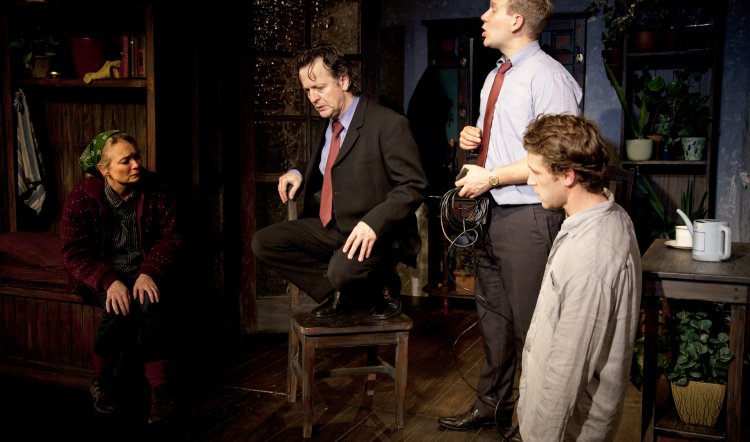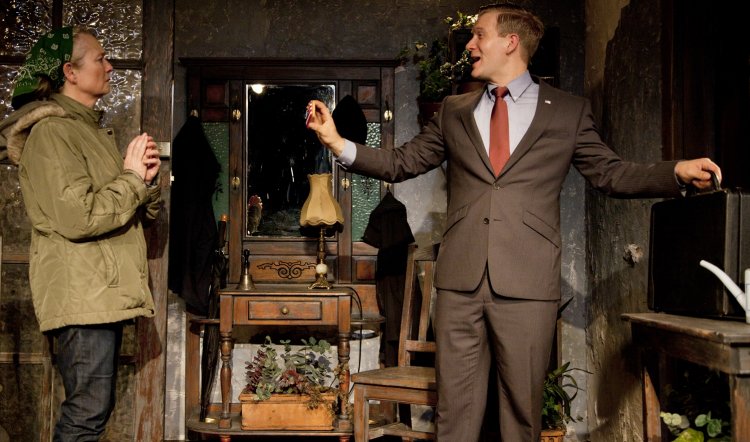
THE GOD OF HELL
THE GOD OF HELL, Mophead Productions with SITC at the Old Fitzroy, 26 August-13 September 2014. Photography by Gareth Davies: above - Vanessa Downing, Tony Poli, Ben McIvor and Jake Lyall. Right: Vanessa Downing and Ben McIvor.
Sam Shephard was never enamoured of the cliches of the American Dream and in this play it has become the Great American Nightmare. Emma (Vanessa Downing) and Frank (Tony Poli) are a couple of mid-west cattle ranchers as classic as apple pie and even more innocent. They live in deepest rural Wisconsin where it seems to be freezing most of the time and where their neighbours are being paid by the government to not farm their land (this is true even though it might appear to be far-fetched)…
Frank lovingly tends his Holstein heifers and Emma lovingly waters her indoor plants. It’s as normal and insular a life as might possibly be imagined. In the basement however is an overnight and unexpected guest: Haynes (Jake Lyall) whose father was Frank’s friend, which is why he has been taken in without question despite circumstances that would make most people deeply suspicious.
It’s not just that he is clearly on the run and terrified of what - or whomever - he’s running from, but also that he emits alarming flashes of lightning if touched and it really can’t be explained away as static. Nevertheless, Emma takes him at face value, makes coffee and sets breakfast bacon to frying in a pan.
This quiet, uneventful life turns pear-shaped when Welch (Ben McIvor) turns up at the front door. For a start Welch is wearing an uneasy blue suit, secondly he’s carrying a substantial briefcase and third, he’s arrived to sell her cookies decorated with the Stars and Stripes. Even gullible Emma is perturbed.
Shephard has, since Ronald Reagan’s day, been a fierce critic of the American right. In recent years his target has become bigger and bigger and ever more surrreal, and this play quickly slips towards the bizarre. What makes it even more weird is that is all seems so … normal. The sinister interloper Welch is so heartily yet alarmingly ordinary (think Jim Carrey in The Truman Show) it’s hard to know whether one would prefer to slap him or - as Emma does - vainly try to show him the door.
Stolid, Holstein-loving Frank isn’t much help as he calmly swallows the line of what’s good for this government agent must be good for them with the same bovine solemnity as his heifers swallow their grass. But the cud comes back to bite them, however, as Emma is tricked into revealing Haynes’s presence.
Who is this jittery man? A lethally contaminated worker from a top secret plant? A symbol of the new American brutality? A victim of torture - or a total nutcase? And who is Welch? A chimera? the American future? And is the extreme loopiness of what transpires out of ordinary domestic beginnings the product of a fertile imagination or a dystopian vision of the future?
As it happens, the play - from 2004 - is uncomfortably prescient in its depiction of state intrusion into private lives and the glib justification - national security - of unacceptable acts. It might be set in Wisconsin but it as easily applies to anywhere touched by the handy furphy of the War on Terror - homegrown or otherwise.

Director Rodney Fisher has assembled a first-rate cast of four, led by the splendid Vanessa Downing - a daffy, wide-eyed rock of unremarkable decency in a world rapidly turning inside out. As her phlegmatic, boot-polishing husband, Tony Poli is the immovable object against whom the irresistible force of her anxiety breaks in waves of pitiful agitation.
Welch, the cookie salesman and purveyor of patriotic paraphernalia, is brought to unnerving life by the sweetly smiling yet menacing performance of Ben McIvor. From his shiny neat hair to the unwavering smile, he is a man to be feared even as he blandly offers reassurances and casually tortures Haynes (a tightly-wired and credible performance from Jake Lyall).
And accent coach Linda Nicholls-Gray deserves mention as the quartet wear their regional American accents as comfortably as well-worn boots - and that’s not easy to achieve or hold and they do.
That this nightmare is funny and believable even as it descends into madness is a tribute to the director’s orchestration of the pace and flow of Shephard’s typically tough poetic prose and the performances he coaxes from his actors. Crucial too is the exquisitely detailed naturalistic setting of the Wisconsin farmhouse: all dark timber panelling, not quite tasteful accoutrements, a cosy dresser upon which domestic fripperies are arrayed and a kitchen sink in a corner.
The tap over this sink is Emma’s life focus as she constantly refills her little watering can to tend to the numerous pot plants. The plumbing is cranky and noisy and the over-watered flora drip constantly (soundscape by Max Lyandvert). Fisher designed the richly detailed set himself - with lighting by Ryan Shuker - and it’s this that allows the lunacy of the second half of the 90-minute play to fly without hindrance or (in lesser hands) a fatal crash into the incredible.
Altogether this production is a stark reminder that there is a depth of talent available to Sydney theatre that is, for the most part, ignored or untapped. The God of Hell is a deeply interesting and absorbing play that makes you laugh even as you might shudder at the relevance of its underlying implications. It’s beautifully realised and hugely entertaining. Another triumph for independent theatre.



